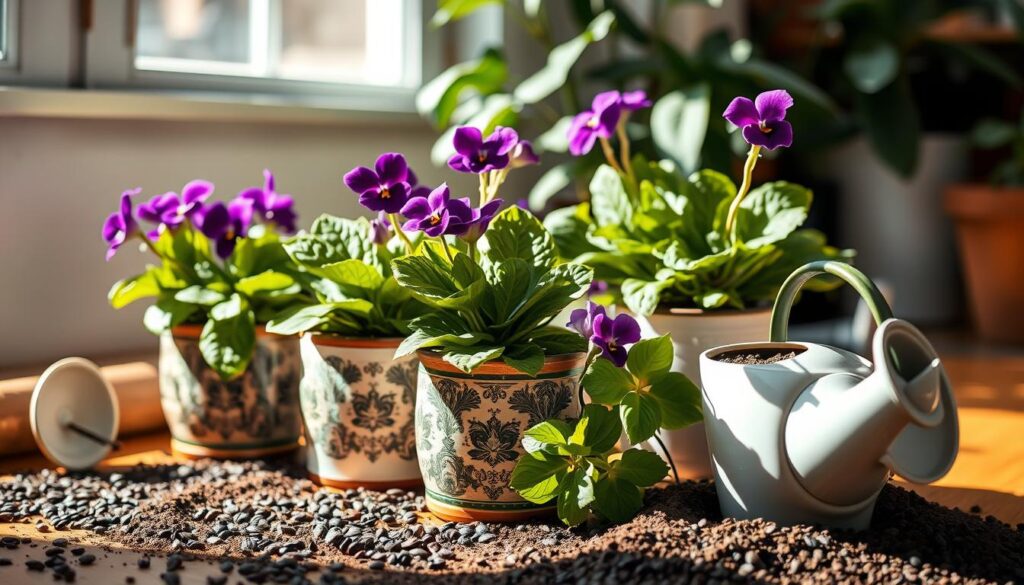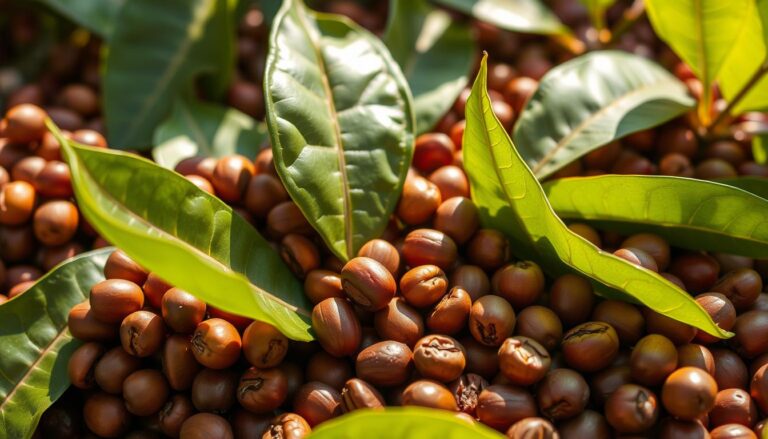Are you tired of struggling to keep your African violets thriving? What if the secret to lush, vibrant plants was hiding in your morning coffee grounds? Coffee grounds can be a natural fertilizer for your African violets, making them a great choice for organic gardening.
Coffee grounds are packed with nutrients like nitrogen, potassium, and calcium. These are essential for your African violets’ health. The trick is to use coffee grounds as plant food correctly.
African violets love slightly acidic soil with a pH between 5.8 and 6.2. Used coffee grounds can help create this perfect environment. But remember, not all plants like coffee grounds. African violets, though, can really benefit from them.
Before adding coffee grounds to your plants, learn how to do it right. It’s all about using the right amount and applying it correctly. This way, you can avoid harming your delicate African violets.
African Violets’ Nutritional Needs
Knowing what African violets need is key to caring for them. These plants need special soil and nutrients to grow well in your home.
Essential Nutrients for Healthy Growth
African violets need a mix of nutrients for bright flowers and strong leaves. The main nutrients are:
- Nitrogen: Helps leaves grow well
- Phosphorus: Builds strong roots
- Potassium: Keeps the plant healthy
How Soil Composition Affects Your Plant
Choosing the right soil mix is very important. A mix with peat moss, perlite, and vermiculite is best. It keeps the soil right for the roots.
The secret to thriving African violets lies in understanding their unique soil preferences.
The Role of pH in African Violet Health
Soil acidity is important for nutrient absorption. African violets do best in soil with a pH of 5.8 to 6.2. The wrong pH can cause:
- Yellow leaves
- Slow growth
- Fewer flowers
Pro tip: Regular soil testing helps you maintain the perfect growing conditions for your African violets.
Benefits of Using Coffee Grounds in Gardening
Turning kitchen waste into a gardening resource can change how you care for houseplants. Coffee grounds are a green way to boost your plants’ health.
Nutritional Value of Coffee Grounds
Coffee grounds are full of nutrients that plants love. They have:
- 2% nitrogen
- 0.6% potassium
- 0.06% phosphorus
- Micronutrients like calcium, magnesium, and iron
Enhancing Soil Structure with Coffee Grounds
Composting coffee grounds does more than just get rid of waste. It makes a soil mix full of nutrients. These grounds can boost soil’s mineral content by up to 35% by volume.
“Coffee grounds are nature’s gift to gardeners, transforming kitchen waste into plant nutrition.”
Improving Drainage and Aeration
Using coffee grounds wisely can make your soil better. Adding them to compost:
- Increases organic matter
- Promotes better water retention
- Improves soil drainage
- Attracts beneficial organisms like earthworms
But remember, use coffee grounds in moderation. Experts say to keep them at 20-35% of your compost. This prevents harm to plant growth.
How to Properly Use Coffee Grounds for African Violets
Using kitchen waste as fertilizer is a smart move for African violet care. Coffee grounds are a great way to feed your plants and reduce waste.

Using coffee grounds for your African violets needs careful thought. Not all coffee grounds are the same. Knowing how to use them right can really help your plants.
Recommended Application Methods
- Sprinkle used, cooled coffee grounds lightly on top of the soil
- Mix coffee grounds into potting soil at a ratio of 10-20%
- Use diluted brewed coffee (1:1 water ratio) as an occasional liquid fertilizer
Ideal Ratios for Mixing with Soil
African violets do best in slightly acidic soil. Moderation is key when adding coffee grounds. Start with a small amount – about one tablespoon for every six-inch pot.
Signs of Overuse and Possible Damage
Look out for signs that you’ve added too much coffee grounds:
- Yellowing leaves
- Leaf curling
- Stunted growth
- Unusual soil compaction
“The secret to successful plant care is observation and gentle intervention.” – Gardening Wisdom
Your African violet will tell you if it’s too much. If you see any stress signs, stop using coffee grounds right away. These plants need a balanced diet and gentle care.
Alternatives to Coffee Grounds for Plant Nutrition
Discovering the right African violet fertilizer can change your houseplant care. Coffee grounds have some benefits, but they’re not the only choice for your plants.

Organic Fertilizers That Work Wonders
Your African violets need the best nutrition. Here are some organic tips for healthy plants:
- Worm castings: A nutrient-rich powerhouse
- Compost: Natural and balanced nutrition
- Specialized African violet fertilizers: Precision-formulated nutrients
Comparing Fertilizer Options
Unlike coffee grounds, special fertilizers give exact nutrients. Commercial products usually have a 14-14-14 NPK ratio. This ensures your African violets get the best care.
“The right fertilizer can make all the difference in your plant’s growth and vitality.” – Plant Nutrition Expert
Selecting the Perfect Fertilizer
For great houseplant care, follow these tips:
- Choose water-soluble formulas
- Look for balanced nutrient profiles
- Supplement with calcium and magnesium
- Follow package instructions carefully
Remember, each plant is different. Try different fertilizers and see how your African violet reacts.
Tips for Growing Healthy African Violets
Learning how to care for African violets is all about finding the right balance. With the right potting mix and care, these plants can become beautiful additions to your home. They thrive with the right environment and care.
Creating the Perfect Growing Environment
Temperature is key for African violet health. Keep the room temperature between 65 to 75 degrees Fahrenheit. Avoid sudden changes in temperature.
Humidity levels should be around 50-60%. This helps your plants feel like they’re in their natural tropical home.
Watering and Nutrient Management
Watering is important, but do it carefully. Use bottom watering to avoid damaging the leaves. Your potting mix should be slightly acidic, with a pH of 6.5 to 6.8.
Every couple of months, leach the soil to remove salts. This prevents nutrient buildup that can harm your plants.
Maintenance and Care Strategies
Regular care is essential for healthy African violets. Repot them every year to refresh the soil and encourage new growth. Use a balanced 10-10-10 fertilizer three to four times a year.
Prune dead leaves to keep your plants looking their best. With these care tips, you’ll have stunning, thriving African violets.






